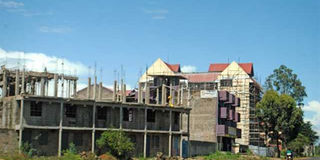Changing face of Thika from industrial hub

An apartment block coming up at Ngoingwa estate in Thika. The estate had been zoned as a single dwelling unit area. PHOTO | MARY WAMBUI | NATION MEDIA GROUP
What you need to know:
- Thika road made the town a preferred residential area for many working and studying in Thika and Nairobi.
- Traffic snarl-up, especially during rush hours, has also become a common feature.
Once regarded as the Birmingham of Kenya for playing host to numerous industries, Thika is slowly shedding its industrial shine and becoming a residential hub owing to the increased establishment of apartments, hostels and private homes.
This shift was largely driven by the completion of the Thika highway.
The highway made the town a preferred residential area for many working and studying in Thika and Nairobi. That it had adequate water supply, security and proximity to Nairobi helped matters.
As people discovered the gem, the population increased exponentially, leading to a strain in existing amenities such as water and roads. The pressing issue now is change in land use in some estates previously set aside as single dwelling zones.
Traffic snarl-up, especially during rush hours, has also become a common feature. This has forced the county government of Kiambu to open up more feeder roads connecting the town to its main exit points.
The Kenya National Highways Authority (KeNHA) is also constructing Thika bypass and more roads to help ease the flow of traffic along Garissa highway, the main route connecting the town to North Eastern and Nairobi county.
WATER SOURCE
A strain in the only water source — River Chania — relied upon by majority of residents and industries has forced Thika Water and Sewerage System to ration the essential commodity especially during the dry seasons.
Thika town planner, Mr Eston Kibutu, told the Nation that the changes have seen the town's central business district expand to Section 9, which has therefore led to an increase in demand for land for use in setting up commercial buildings as is common with all locations next to a CBD.
High rise commercial buildings are cropping up in areas previously zoned out as single dwelling residential locations like Ngoingwa, an estate that stretches all the way to M-Pesa Academy along Mang'u Road near Thika superhighway leading to conflict between original dwellers who've built homes at the estate and the upcoming investors.
A recent meeting called and chaired by Kiambu county director for urban development and management, Ms Jane Wanjiku Mwaniki, to address the conflict ended in disarray as the two teams failed to reach a consensus.
While those who bought land and built bungalows and maisonettes in accordance to the zoning of the area maintain that high rise buildings are illegal and should be demolished as they breed insecurity and rip them off their privacy, the investors maintain that the initial plan of the area has been overtaken by time and events owing to the pressing demand for housing in the country.
HIGHRISE BUILDINGS
"The setting up of high-rise buildings puts a strain on the existing sewage system and water resource since the initial plan did not factor such establishments.
The county administration has also not announced of a change in the land use of this area, which means that the constructions are being done illegally," said George Mwangi, a resident.
Others residents claimed that the investors have formed a habit of building their flats at night when residents are asleep to avoid getting reproached by the locals.
The construction boom has also seen some of the buildings constructed on water ways which lead to heavy flooding during the rainy season, a situation that forced a number of families to vacate their mansions temporarily.
INADEQUATE PLANNING
Thieves took advantage of the situation and robbed several homes. Mr Paul Ndung'u, a resident, told Nation that before the estate was subdivided, the land was a coffee plantation.
He confirmed that the original plan for the area was done by the defunct municipal council which indicated that it is a reserve for single dwelling units mainly non-storey bungalows and maisonettes.
Dr Peter Ngatia, an entrepreneurship expert, says proper planning should be able to eradicate fears of inadequate planning among residents living in areas properly zoned for single dwelling units.
Area MCA Andrew Kimani has proposed that all high rise buildings under construction be halted until their approvals are confirmed.





